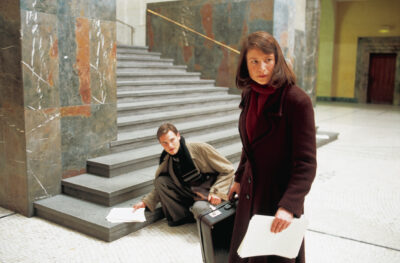
SOPHIE SCHOLL: THE FINAL DAYS screenwriter Fred Breinersdorfer in person for a Q&A at the Royal.


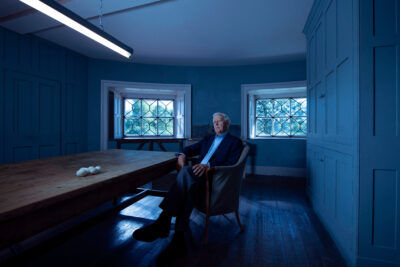
“In Errol Morris’s documentary, the sense of getting nowhere in particular proves to be crucial toward grasping John le Carré in all his impish glory.” ~ Keith Uhlich, Slant Magazine
“Through it all is the tension of whether one can truly know le Carré, a man who first made a living hiding his true self, and then another living as a writer delving into it. Morris captures that paradox… quite perfectly.” ~ David Sims, The Atlantic
“An interrogation of art and artist, The Pigeon Tunnel is an enthralling documentary both for fans of le Carré and those who’ve never read a page of his work.” ~ Barry Levitt, Empire Magazine
“Errol Morris’s biographical documentaries have got to the heart of figures ranging from Stephen Hawking to Donald Rumsfeld, but in John le Carré he has found a subject as unknowable as he is eloquent.” ~ Jake Kerridge, Daily Telegraph
“The result is a wide-ranging dialogue that manages to be both philosophical and playful, a personal portrait that goes exactly as deep as Cornwell wants it to go but never feels as if the author is getting away with obfuscation.” ~ Steve Pond, TheWrap
“He’s a grand chronicler of his own biography, and expertly goaded on by Morris, whose queries challenge present and past statements and compel further elaboration and contemplation.” ~ Nick Schager, The Daily Beast
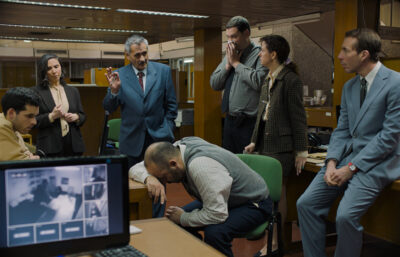
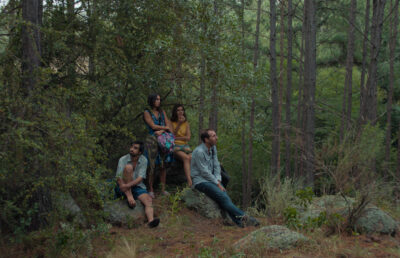
“Rodrigo Moreno’s dreamy and discursive The Delinquents might kick off with one of the most low-key bank robberies anyone has ever attempted, but it’s hard to overstate how thrilling it feels once the thief finally tells us about what he stole.” ~ David Ehrlich, indieWire
Moreno wrote the following about The Delinquents: One issue comes forth naturally when considering this film is the matter of freedom in the face of the mechanical routine imposed by work.
Morán imagines a risky plan to conquer that liberation even when it implies committing a crime and paying his dues. Román is his accessory.
These two men embody a collective fantasy: to break free from the rigors and obligations of the working life in order to attain a higher life filled with freedom.
To choose a better life means leaving the city, your job, even a family, and moving to the countryside, the ocean, the mountains, to give in to leisure, and to stop depending on something or someone. There are both existential and practical matters that make this dream a difficult one: How to make a living? How can I live without all the things I already have? When should I pursue it?
The protagonist solves these questions by virtue of a crime: to rob from a bank (the same bank he´s employed by) the equivalent of his salary times 25 years. It’s not about being millionaires; it’s about living without working all the way to the end.
As is the case in heist movies, the morality of the robbery is not the object, even more so when the target is a bank. I’m invoking the old maxim, always ascribed to Brecht, that it is a worse crime to establish a bank than it is to rob one.
This film, in that sense, takes a more anarchistic viewpoint and does not dwell on these bourgeois matters, but rather contemplates the notion that modern life, as it is intended, obliterates the possibility of a truly free man. It is this tension that Morán’s dream is built upon, that he finally acquires by means of the sacrifice of imprisonment. It is said in a passage of the film that the incarceration of jail for three years and a half is preferable to the incarceration of working for the rest of your life.
Subject Q&A schedule at the Laemmle Glendale.
7 pm, Friday, November 3rd: Post-screening Q&A with Subject co-director Jen Tiexiera along with producer and documentary subjects Margie Ratlif (The Staircase), co-producer and subject Jesse Friedman (Capturing the Friedmans), Executive Producer Alexandra Johnes (Time Studios) and cultural strategist Sonya Childress (Color Congress, Perspective Fund). Moderated by Sara Yasin (Managing Editor, Los Angeles Times).
7 pm, Saturday, November 4th: Post-screening Q&A with co-director Jen Tiexiera along with producer and documentary subjects Margie Ratlif (The Staircase), co-producer and subject Jesse Friedman (Capturing the Friedmans), Executive Producer Alexandra Johnes (Time Studios). Moderated by Matt Carey (Documentary Awards Editor, Deadline Hollywood).
4:10 pm, Sunday, November 5th: Post-screening Q&A with co-director Jen Tiexiera along with producer and documentary subjects Margie Ratlif (The Staircase), co-producer and subject Jesse Friedman (Capturing the Friedmans), Executive Producer Alexandra Johnes (Time Studios). Moderated by Caroline Libresco (Co-Executive Director, Jewish Story Partners)
Laemmle Theatres and the Anniversary Classics Series present a 35th anniversary screening of the potent Oscar-nominated drama Running on Empty, written by Naomi Foner and directed by Sidney Lumet in one of his late-career highlights. Christine Lahti, who was named best actress of the year by the Los Angeles Film Critics Association for her performance, Judd Hirsch, River Phoenix, and Martha Plimpton star in one of the few movies to examine the consequences of the revolutionary movements that swept America in the late 1960s and early 1970s. The film earned two Oscar nominations in 1988, for Foner’s original screenplay and for Phoenix as Best Supporting actor. We’ll screen Running on Empty at the Royal on October 24 at 7 pm with Ms. Lahti as our special guest.
Lahti and Hirsch play a married couple who were part of a 1960s revolutionary group, probably modeled on the Weather Underground, who participated in the bombing of a napalm laboratory that resulted in the serious injury of a janitor who was not supposed to be on the premises. Since then, they and their two sons have been on the run from the FBI, constantly changing their identities and moving when the authorities seemed close to locating them. An added complication arises when their teenage son, played by Phoenix, begins to demonstrate extraordinary gifts as a pianist, and the parents realize that their unsettled lives could hinder the development of his talent. At the same time, Phoenix falls in love with the daughter (Plimpton) of his music teacher and feels compelled to reveal his true identity to her.
Lumet (12 Angry Men, Dog Day Afternoon, Network, The Verdict), who received an honorary Oscar late in his life, brought his characteristic dramatic vigor and emotional intensity to the film. A highlight is the meeting between Lahti and her long estranged father, played by Steven Hill, that is one of the most wrenching scenes in any film of the period. Most critics recognized the film’s achievements. Roger Ebert called it “one of the best films of the year,” and Newsweek’s David Ansen called it “emotionally overpowering.” Kevin Thomas of the Los Angeles Times wrote, “Sophisticated, uncompromising and refreshingly original, it is one of those rare films which is likely to mean as much to teens as it does to their parents.”
Christine Lahti made her film debut opposite Al Pacino in 1979 in …And Justice for All. She went on to co-star in Whose Life Is It Anyway? opposite Richard Dreyfuss, The Doctor with William Hurt, Just Between Friends with Mary Tyler Moore, Bill Forsyth’s Housekeeping, and, more recently, A Beautiful Day in the Neighborhood with Tom Hanks. She earned an Oscar nomination when she co-starred with Goldie Hawn in Swing Shift. Later she won an Oscar for a live action short film that she directed, Lieberman in Love, in 1995. Lahti won an Emmy for her starring role in the hit TV series, Chicago Hope, and also had a recurring role in Law and Order SVU. In 2001 she directed her first feature, My First Mister, starring Albert Brooks and Leelee Sobieski.
Judd Hirsch has received two Oscar nominations for Best Supporting Actor—for the Oscar-winning best picture of 1980, Ordinary People, and for his performance just last year in Steven Spielberg’s acclaimed memory piece, The Fabelmans. He also won two Emmy Awards for his performance in the critically acclaimed and immensely popular TV show of the late 1970s, Taxi. Among his other notable feature film credits are Independence Day, A Beautiful Mind, The Meyerowitz Stories, and Uncut Gems. Hirsch co-starred in several other TV series—Dear John, Damages, Superior Donuts, and The Goldbergs.
“Margot met Robert on a Wednesday night toward the end of her fall semester. She was working behind the concession stand at the artsy movie theatre downtown when he came in and bought a large popcorn and a box of Red Vines.”
So begins Kristen Roupenian’s short story Cat Person. When The New Yorker published it in 2017, it struck a nerve with readers and was the first work of short fiction to ever go viral, spurring conversations around the world about the modern dating scene, seduction, and consent. After the film adaptation’s buzzy premiere at Sundance in January, Cat Person is finally where it belongs, at “artsy movie theatre[s],” opening this weekend at the Royal, Town Center and Glendale and October 13 at the Monica Film Center and NoHo. We’re also pleased to host two special screenings at the NoHo with the filmmaker Susanna Fogel in person for conversations with social activist and writer Monica Lewinsky on October 12 and with actor-writer-director Alex Winter on October 13.
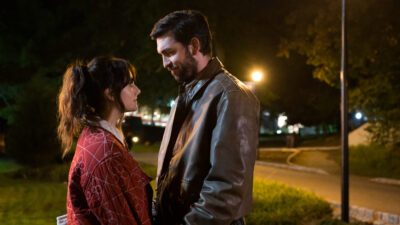
Director Susanna Fogel stated “Like the short story that stirred so much controversy, Cat Person will call upon you to reflect on romantic encounters you’ve had in the past, and to question the role (or multiple roles) you may have played. We’ve all been the victim in some narratives and the villain in others, and I hope you’ll walk out of this film with a strong opinion, ready to debate.”
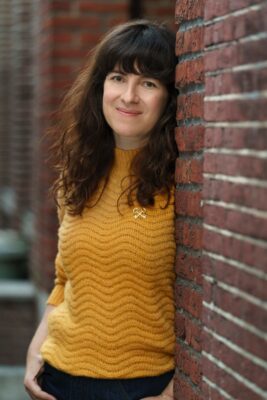

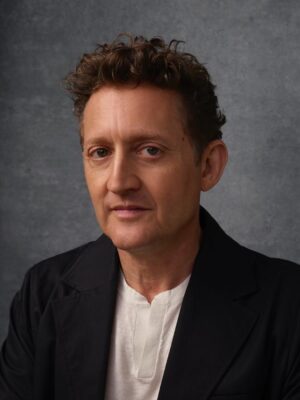
“A film that’s funny in places, horrifying in others and all but destined to be a reference point in future discussions about courtship.” ~ Peter Debruge, Variety
“The relief…is in the filmmakers’ approach to these tense scenes: Fogel and Ashford loosen their grip, at last trusting us to sit in our discomfort, draw our own conclusions and sharpen our tools for the discourse.” — The Hollywood Reporter
